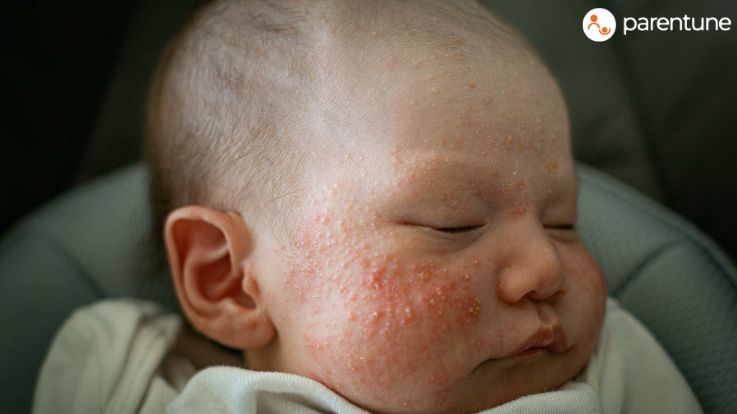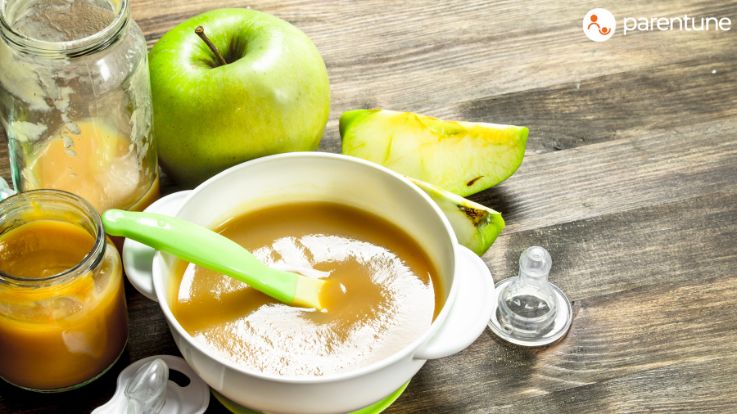Identifying & Managing Food Allergies In 6 Month To 1 Year Old Babies

As per the Food and Agriculture Organization, nearly 220 million people across the globe have food allergies. 90% of these allergies are caused by just 8 foods as per the Food and Drug Administration.
The transition from solely breastfeeding to complementary feeding is a crucial milestone for the baby, as well as the parents. This marks the beginning of a completely new journey, in which your child gets to explore various different textures and flavours. While this transition is quite smooth for many babies, some of them can actually develop an allergic reaction to certain food items. The best way to deal with this problem is by taking proactive measures and identifying potential allergens. This blog will help you understand how you can identify the signs of food allergies in your baby.
What Is A Food Allergy?
A food allergy may be defined as an adverse reaction that is triggered by something we consume. Our immune system may react to certain foods, perceiving them as a danger to our body and release Immunoglobulin E antibodies (IgE), which on reacting with the food give rise to a wide range of symptoms that can range from mild to severe, and even prove to be life threatening. Some food allergies can also be non IgE mediated.
Food allergies are more common in children than in adults. According to an article by NIH, “The worldwide prevalence of food allergy is estimated to be around 4% of children and 1% of adults.” The possible cause of this is the slow maturation of TH1 immune response which happens in the first 12 to 18 months (Allergies In Children by Zave Chad).
What Causes Food Allergies In Babies?
In the Western countries, food allergies in babies are mostly caused by soy, fish, dairy, eggs, wheat and peanuts, however, in India, the major culprits are rice, chicken and cow milk. Nut allergies are not very common in Indian babies.

Are Food Allergies The Same As Food Intolerance?
Food intolerance and food allergies are two different things that may be confused for one another. Food allergies are caused by an immune response whereas the immune system plays no role in food intolerance. So, if a child gets diarrhoea after drinking cowmilk, it means they are lactose intolerant and not allergic. This usually happens when there are some underlying conditions or factors, such as IBS, stress and enzyme deficiency, that can make one more sensitive to certain foods.
How To Recognize Food Allergies In Babies?
If a baby is allergic to certain foods, they may present with some symptoms that parents need to watch out for.
For IgE mediated allergies, the symptoms can be seen within 30 mins to 2 hours of ingestion and include:
-
The baby's eyes become watery and itchy. There may be some swelling.
-
The baby may have a runny or stuffy nose.
-
The baby will start sneezing or coughing after eating
-
Their mouth becomes swollen and itchy
-
Their throat becomes hoarse
-
They start wheezing or have difficulty in breathing
-
The baby becomes pale or loses consciousness
-
They feel nauseated or vomit. Some may have cramps or diarrhoea
-
The baby develops hives and eczema. Their skin becomes itchy

If your baby is presenting with any of these symptoms, it is important to seek prompt medical help and get your child evaluated. Doctors use diagnostic modalities like Serum-specific IgE (RAST), skin prick test and food challenges to confirm the diagnosis.
Non IgE mediated allergies show up after a couple of hours, or even days of ingestion. Common symptoms include:
-
Vomiting and diarrhoea
-
Colic pain
-
Traces of blood in stool
-
Gastroesophageal reflux
-
Food aversion
If your child is presenting with any of these symptoms, get in touch with their paediatrician and eliminate the diet for 2 to 6 weeks.
Management Of Food Allergies In Babies
The Indian Academy of Paediatrics (IAP). recommends a few guidelines for the management of food allergies in babies. These include:
Education & Awareness
-
Avoidance of allergenic foods. This is the easiest, safest and most effective way to prevent allergies.
-
Educating parents and guardians about the symptoms of food allergies and when to seek medical help.
-
Raising awareness about paying attention food labels to check for allergenic ingredients and avoiding cross contamination
-
Providing personalized allergy management plans which may include medication and injection in the case of serious allergic reactions
More Active Approach
-
Introducing dietary foods earlier. According to The LEAP (Learning Early About Peanut Allergy) Study, if peanuts are introduced before 11 months, the risks of developing allergic reactions are greatly reduced.
-
Active anticipatory testing, which means testing for co-allergens along with the suspected allergens. For instance, if your child is allergic to peanuts, you may also consider testing them for allergies associated with tree nuts and sesame seeds
New Strategies
These strategies may be recommended for accidental consumption of allergenic foods or cases where it is not possible to avoid the same.
-
Desensitization—oral immunotherapy (OIT) may be recommended which involves the gradual introduction of allergenic foods, starting with very small doses, to build tolerance. However, this should be done only after consulting with the paediatrician as the technique has its own limitations and the child may develop a serious reaction.
-
Baked milk/egg may be introduced at an early stage and it has been seen that almost 70 to 75 percent of children who are allergic to these two are able to tolerate them when heated at high temperatures.
Prevention Of Food Allergies In Babies
-
Expecting mothers should take a well-balanced diet without restricting allergenic foods during pregnancy and breastfeeding.
-
The baby should be exclusively breastfed for the first 6 months of life
-
Introduce complementary feeding at 6 months and give small amounts of veggies, fruits and starchy foods in pureed form. No salt or sugar.

-
Aim to introduce inclusion foods that are a part of the family’s normal diet, before 12 months. Make sure you only introduce one food at a time.
-
Continue feeding such foods to the baby on a regular basis unless not tolerated, to lower the risks of developing allergies.
-
Never feed coarsely chopped nuts to your baby as these can rove to be choking hazards.
Be the first to support
Be the first to share
Comment (0)
Related Blogs & Vlogs
No related events found.
Loading more...